| Listing 1 - 10 of 10 |
Sort by
|
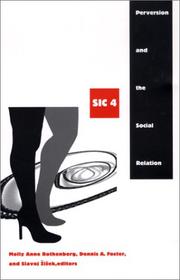
ISBN: 0822330970 0822330857 Year: 2003 Publisher: Durham Duke university press
Abstract | Keywords | Export | Availability | Bookmark
 Loading...
Loading...Choose an application
- Reference Manager
- EndNote
- RefWorks (Direct export to RefWorks)
American fiction --- Paraphilias in literature. --- Paraphilias. --- Psychoanalysis and literature. --- History and criticism --- Theory, etc. --- Paraphilias --- Paraphilias in literature --- Psychoanalysis and literature --- Literature and psychoanalysis --- Psychoanalytic literary criticism --- Sexual deviation in literature --- Sexual perversion in literature --- Deviant sexual behavior --- Deviation, Sexual --- Deviations, Sex --- Sex deviation --- Sexual deviation --- History and criticism&delete& --- Theory, etc --- Literature --- Sex --- Psychosexual disorders --- American literature
Book
ISBN: 0801460239 0801448204 Year: 2010 Publisher: Ithaca : Cornell University Press,
Abstract | Keywords | Export | Availability | Bookmark
 Loading...
Loading...Choose an application
- Reference Manager
- EndNote
- RefWorks (Direct export to RefWorks)
In an original and provocative reading of Vladimir Nabokov's work and the pleasures and perils to which its readers are subjected, Eric Naiman explores the significance and consequences of Nabokov's insistence on bringing the issue of art's essential perversity to the fore. Nabokov's fiction is notorious for the interpretive panic it occasions in its readers, the sense that no matter how hard he or she tries, the reader has not gotten Nabokov "right." At the same time, the fictions abound with characters who might be labeled perverts, and questions of sexuality lurk everywhere. Naiman argues that the sexual and the interpretive are so bound together in Nabokov's stories and novels that the reader confronts the fear that there is no stable line between good reading and overreading, and that reading Nabokov well is beset by the exhilaration and performance anxiety more frequently associated with questions of sexuality than of literature. Nabokov's fictions pervert their readers, obligingly training them to twist and turn the text in order to puzzle out its meanings, so that they become not better people but closer readers, assuming all the impudence and potential for shame that sexually oriented close-looking entails. In Nabokov, Perversely, Naiman traces the connections between sex and interpretation in Lolita (which he reads as a perverse work of Shakespeare scholarship), Pnin, Bend Sinister, and Ada. He examines the roots of perverse reading in The Defense and charts the enhanced attention to the connection between sex and metafiction in works translated from the Russian. He also takes on books by other authors-such as Reading Lolita in Tehran-that misguidedly incorporate Nabokov's writing within frameworks of moral usefulness. In a final, extraordinary chapter, Naiman reads Dostoevsky's The Double with Nabokov-trained eyes, making clear the power a strong writer can exert on readers.
Paraphilias in literature. --- Sex in literature. --- Sexual deviation in literature --- Sexual perversion in literature --- Nabokov, Vladimir Vladimirovich, --- Sirin, Vladimir, --- Sirin, Vl. --- Sirin, V. --- Nabokoff-Sirin, Wladimir, --- Sirin, Wladimir Nabokoff-, --- Nabokov, Vladimir, --- Shishkov, Vasiliĭ, --- Набоков, Владимир Владимирович, --- Набоков, Владимир, --- נאבוקוב, ולאדימיר ולאדימירוביץ׳, --- נאבוקוב, ולאדימיר, --- נבוקוב, ולדימיר, --- 納布可夫, --- Godunov-Cherdynt︠s︡ev, Fedor --- Criticism and interpretation.
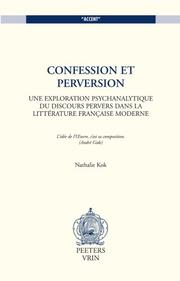
ISBN: 9042909676 2877235467 Year: 2000 Volume: *14 Publisher: Leuven : Paris : Editions Peeters, Librairie J. Vrin,
Abstract | Keywords | Export | Availability | Bookmark
 Loading...
Loading...Choose an application
- Reference Manager
- EndNote
- RefWorks (Direct export to RefWorks)
Franse letterkunde --- Lacan, Jacques --- Littérature française --- Psychanalyse --- Psychoanalyse --- 82:159.9 --- 840 "19" --- #GOSA:VIII.Lok.F.M --- Literatuur en psychologie. Literatuur en psychoanalyse --- Franse literatuur--20e eeuw. Periode 1900-1999 --- 840 "19" Franse literatuur--20e eeuw. Periode 1900-1999 --- 82:159.9 Literatuur en psychologie. Literatuur en psychoanalyse --- Confession in literature --- French literature --- Paraphilias in literature --- Psychoanalysis and literature --- Literature and psychoanalysis --- Psychoanalytic literary criticism --- Literature --- Sexual deviation in literature --- Sexual perversion in literature --- History and criticism --- Lacan, Jacques,
Book
ISBN: 9780729410649 0729410641 Year: 2013 Volume: 2013:03 Publisher: Oxford : Voltaire Foundation,
Abstract | Keywords | Export | Availability | Bookmark
 Loading...
Loading...Choose an application
- Reference Manager
- EndNote
- RefWorks (Direct export to RefWorks)
Sade, de, Donatien A.F. --- Paraphilias in literature. --- Erotic literature, French --- Perversion dans la littérature --- Littérature érotique française --- History and criticism --- Histoire et critique --- Sade, --- Criticism and interpretation. --- Perversion dans la littérature --- Littérature érotique française --- Paraphilias in literature --- Sexual deviation in literature --- Sexual perversion in literature --- De Sade, --- Marquis de Sade, --- Sad, --- Sade, D.-A.-F. --- Sade, Donatien Alphonse François, --- Sade, Donatien-Alphonse-François, --- סדגרוב, ג׳ודי, --- Sade, Donatien Alphonse François, --- Sade, Donatien-Alphonse-François, --- סדגרוב, ג׳ודי, --- de Sade, Donatien Alphonse François --- Sade, Donatien Alphonse François de --- Donatien Alphonse François de Sade
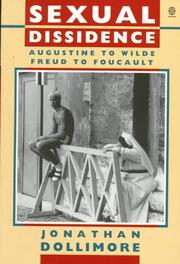
ISBN: 0198112696 0198112254 0191670731 Year: 1991 Publisher: Oxford New York Clarendon Press Oxford University Press
Abstract | Keywords | Export | Availability | Bookmark
 Loading...
Loading...Choose an application
- Reference Manager
- EndNote
- RefWorks (Direct export to RefWorks)
Fonds Suzan Daniel (FSD)
392.6 --- 82-993 --- 82-993 Erotische literatuur --- Erotische literatuur --- 392.6 Seksualiteit. Seksueel leven. Concubinaat. Samenwonen. Prostitutie. Erotiek. Seksuele gebruiken. Liefdeskunst --- Seksualiteit. Seksueel leven. Concubinaat. Samenwonen. Prostitutie. Erotiek. Seksuele gebruiken. Liefdeskunst --- 82:159.9 --- 82:159.9 Literatuur en psychologie. Literatuur en psychoanalyse --- Literatuur en psychologie. Literatuur en psychoanalyse --- Paraphilias --- Paraphilias in literature --- Sexual deviation in literature --- Sexual perversion in literature --- Deviant sexual behavior --- Deviation, Sexual --- Deviations, Sex --- Sex deviation --- Sexual deviation --- Sex --- Psychosexual disorders --- Thematology --- Sexology --- Literature --- Paraphilias in literature. --- Paraphilias. --- Perversion --- Sexual deviation. --- Sexual deviation in literature. --- Sociology of literature
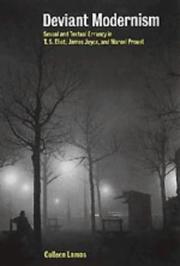
ISBN: 1107115191 0521118670 1280161817 0511116977 0511149689 0511302975 0511485131 0511050771 0511007035 9780511007033 0511035535 9780511035531 9780511116971 9780521624183 0521624185 9780521118675 9781280161810 9780511149689 9780511302978 9780511485138 9780511050770 9781107115194 Year: 1998 Publisher: Cambridge : Cambridge University Press,
Abstract | Keywords | Export | Availability | Bookmark
 Loading...
Loading...Choose an application
- Reference Manager
- EndNote
- RefWorks (Direct export to RefWorks)
This original study re-evaluates central texts of the modernist canon - Eliot's early poetry including The Waste Land, Joyce's Ulysses and Proust's Remembrance of Things Past - by examining sexual energies and identifications in them that are typically regarded as perverse. According to modern cultural discourses and psychosexual categorizations, these deviant desires and identifications feminize men, or tend to render them homosexual. Colleen Lamos's analysis of the operations of gender and sexuality in these texts reveals conflicts, concerning the definition of masculine heterosexuality, which cut across the aesthetics of modernism. She argues that canonical male modernism, far from being a monolithic entity with a coherently conservative political agenda, is in fact the site of errant impulses and unresolved struggles. What emerges is a reconsideration of modernist literature as a whole, and a recognition of the heterogeneous forces which formed and deformed modernism.
Paraphilias in literature. --- Gender identity in literature. --- Masculinity in literature. --- Modernism (Literature) --- Sex in literature. --- Men in literature. --- Crepuscolarismo --- Literary movements --- Masculinity (Psychology) in literature --- Sexual deviation in literature --- Sexual perversion in literature --- Eliot, T. S. --- Proust, Marcel, --- Joyce, James, --- Homer. --- Birmingham, Kevin. --- Eliot, Thomas Stearns --- Criticism and interpretation. --- Modernism (Literature). --- Arts and Humanities --- Literature --- Ai-lüeh-tʻe, --- Īliyūt, T. S., --- Elliŏtʻŭ, --- Eliot, Thōmas S., --- Eliot, Th. S., --- Eliot, Thomas Stern, --- Elyoṭ, T. S., --- Ėliot, Tomas Stirns, --- אליוט ט.ס --- אליוט, ת. ס.
Book
ISBN: 1283250365 9786613250360 0226724603 9780226724607 9781283250368 9780226724614 0226724611 Year: 2011 Publisher: Chicago ; London : University of Chicago Press,
Abstract | Keywords | Export | Availability | Bookmark
 Loading...
Loading...Choose an application
- Reference Manager
- EndNote
- RefWorks (Direct export to RefWorks)
Conservative thinkers of the early Middle Ages conceived of sensual gratification as a demonic snare contrived to debase the higher faculties of humanity, and they identified pagan writing as one of the primary conduits of decadence. Two aspects of the pagan legacy were treated with particular distrust: fiction, conceived as a devious contrivance that falsified God's order; and rhetorical opulence, viewed as a vain extravagance. Writing that offered these dangerous allurements came to be known as "hermaphroditic" and, by the later Middle Ages, to be equated with homosexuality. At the margins of these developments, however, some authors began to validate fiction as a medium for truth and a source of legitimate enjoyment, while others began to explore and defend the pleasures of opulent rhetoric. Here David Rollo examines two such texts-Alain de Lille's De planctu Naturae and Guillaume de Lorris and Jean de Meun's Roman de la Rose-arguing that their authors, in acknowledging the liberating potential of their irregular written orientations, brought about a nuanced reappraisal of homosexuality. Rollo concludes with a consideration of the influence of the latter on Chaucer's Pardoner's Prologue and Tale.
Paraphilias in literature. --- Intersexuality in literature. --- Homosexuality in literature. --- Literature, Medieval --- Latin literature, Medieval and modern --- Hermaphroditism in literature --- Sexual deviation in literature --- Sexual perversion in literature --- History and criticism. --- Martianus Capella. --- William, --- Guillaume, --- Jean, --- Alanus, --- Chopinel, Jean, --- Clopinel, Jean, --- De Meun, Jean, --- Jean Chopinel de Meun, --- Jean Clopinel de Meun, --- Jean de Meun, --- Jehan, --- Meun, Jean de, --- Clopinel, J. --- Criticism and interpretation. --- hermaphroditic, hermaphrodite, fiction, fictional, middle ages, medieval, time period, era, history, historical, conservative, sensual, sensuality, sexuality, sex, gratification, religion, religious studies, faith, belief, morals, purity, human nature, sin, sinful, taboo, pagan, extravagance, opulence, rhetorical, god, homosexuality, roman de la rose, literature, literary, chaucer, pardoners tale.

ISBN: 0521863988 9780521863988 9780511484896 051124634X 9780511246340 9780511247019 051124701X 9786610703685 661070368X 051124486X 0511318839 9780511318832 1280703687 9781280703683 0511484895 0511245637 9780511245633 1107169194 Year: 2006 Publisher: Cambridge : Cambridge University Press,
Abstract | Keywords | Export | Availability | Bookmark
 Loading...
Loading...Choose an application
- Reference Manager
- EndNote
- RefWorks (Direct export to RefWorks)
It has long been recognised that the Gothic genre sensationalised beliefs and practices associated with Catholicism. Often, the rhetorical tropes and narrative structures of the Gothic, with its lurid and supernatural plots, were used to argue that both Catholicism and sexual difference were fundamentally alien and threatening to British Protestant culture. Ultimately, however, the Gothic also provided an imaginative space in which unconventional writers from John Henry Newman to Oscar Wilde could articulate an alternative vision of British culture. Patrick O'Malley charts these developments from the origins of the Gothic novel in the mid-eighteenth century, through the mid-nineteenth-century sensation novel, toward the end of the Victorian Gothic in Bram Stoker's Dracula and Thomas Hardy's Jude the Obscure. O'Malley foregrounds the continuing importance of Victorian Gothic as a genre through which British authors defined their culture and what was outside it.
English fiction --- Gothic revival (Literature) --- Paraphilias in literature. --- History and criticism. --- Catholic Church --- In literature. --- Paraphilias in literature --- Sexual deviation in literature --- Sexual perversion in literature --- History and criticism --- Literary movements --- Revival movements (Art) --- Romanticism --- Gothic fiction (Literary genre), English --- English gothic fiction (Literary genre) --- Church of Rome --- Roman Catholic Church --- Katholische Kirche --- Katolyt︠s︡ʹka t︠s︡erkva --- Römisch-Katholische Kirche --- Römische Kirche --- Ecclesia Catholica --- Eglise catholique --- Eglise catholique-romaine --- Katolicheskai︠a︡ t︠s︡erkovʹ --- Chiesa cattolica --- Iglesia Católica --- Kościół Katolicki --- Katolicki Kościół --- Kościół Rzymskokatolicki --- Nihon Katorikku Kyōkai --- Katholikē Ekklēsia --- Gereja Katolik --- Kenesiyah ha-Ḳatolit --- Kanisa Katoliki --- כנסיה הקתולית --- כנסייה הקתולית --- 가톨릭교 --- 천주교 --- Arts and Humanities --- Literature
Book
ISBN: 1526102110 1781707448 9781781707449 9781526102119 9780719091643 0719091640 Year: 2015 Publisher: Manchester, UK : Manchester University Press,
Abstract | Keywords | Export | Availability | Bookmark
 Loading...
Loading...Choose an application
- Reference Manager
- EndNote
- RefWorks (Direct export to RefWorks)
Explores the implications of scientific discourse on Russian concepts of mental illness and national health
Mental illness --- Mental health --- Science --- Russian literature --- Art and mental illness --- Madness --- Mental diseases --- Mental disorders --- Disabilities --- Psychology, Pathological --- Emotional health --- Mental hygiene --- Mental physiology and hygiene --- Happiness --- Health --- Public health --- Psychiatry --- Psychology --- Natural science --- Natural sciences --- Science of science --- Sciences --- Insanity and art --- Mental illness and art --- Psychiatry and art --- Psychotic art --- Art --- Art brut --- History and criticism. --- Andreyev, Leonid, --- Criticism and interpretation. --- Mental health. --- Degeneration in literature. --- Mental illness in literature. --- Ethics in literature. --- Paraphilias in literature. --- Neurasthenia. --- Cultural Studies --- Literary Studies: Plays & Playwrights --- LITERARY CRITICISM / Drama --- Eastern Europe --- Russia --- Social conditions --- Breakdown, Nervous --- Exhaustion, Nervous --- Nervous breakdown --- Nervous exhaustion --- Nervous prostration --- Neurasthenic neuroses --- Prostration, Nervous --- Asthenia --- Somatoform disorders --- Sexual deviation in literature --- Sexual perversion in literature --- Insanity in literature --- Psychopathology in literature --- Soviet Union --- Decadence. --- Degeneration. --- Illness narrative. --- Leonid Andreev. --- Madness. --- Psychiatry. --- Russian fin de siècle. --- Russian literature.
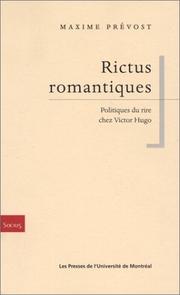
ISBN: 2760618277 9791036503788 2760623696 9782760623699 9782760618275 2760629082 Year: 2002 Volume: 37/2 Publisher: Presses de l’Université de Montréal
Abstract | Keywords | Export | Availability | Bookmark
 Loading...
Loading...Choose an application
- Reference Manager
- EndNote
- RefWorks (Direct export to RefWorks)
Les efforts de l'homme pour se procurer de la joie sont parfois dignes de l'attention du philosophe, écrit Victor Hugo dans L'Homme qui rit. Comme les autres romantiques, il fait pourtant peser un énorme soupçon sur le rire et sur la gaieté. Les rictus omniprésents sous sa plume et celle de ses contemporains appartiennent tant au sadisme qu'à la souffrance, tant au bourreau qu'à sa victime. Alors que notre époque se montre friande de bonne humeur, de fêtes, de festivals, Victor Hugo et ses contemporains des quatre coins de l'Europe jugent que la joie est mal à-propos, elle qui résonne au milieu des souffrances populaires. Il peut lui arriver de sourire ou de verser des larmes, mais le héros hugolien ne rit pas, sauf si on l'y oblige. Doit-on encore lire les romantiques aujourd'hui ? Oui, parce qu'ils nous rappellent qu'il faut résister à la dictature contemporaine de l'allégresse, du rire de force. Voilà pourquoi Rictus romantiques se termine par un « Éloge de la mauvaise humeur ».
Cheerfulness in literature --- Droefheid in de literatuur --- Gaieté dans la littérature --- Lach in de literatuur --- Laughter in literature --- Perversion sexuelle dans la litterature --- Rire dans la littérature --- Sadness in literature --- Seksuele afwijkingen in de literatuur --- Sexual deviation in literature --- Tristesse dans la littérature --- Vrolijkheid in de literatuur --- Hugo, Victor, --- Criticism and interpretation --- Rire dans la littérature. --- Perversion dans la littérature. --- Gaieté dans la littérature. --- Tristesse dans la littérature. --- Laughter in literature. --- Sexual deviation in literature. --- Cheerfulness in literature. --- Sadness in literature. --- Critique et interprétation. --- Criticism and interpretation. --- Sexual perversion in literature --- Hugo, Victor --- Hugo, Victor-Marie --- Hjuho, Viktor --- African literature (French) --- History and criticism. --- Hiwkō, Vikʻtʻor, --- Hījū, Fīktūr, --- Gi︠u︡go, Viktor, --- Hsiao-o, --- Hyowgo, Viktor, --- Hugo, Victor Marie, --- Yü-kuo, Wei-kʻo-to, --- Yü-kuo, --- Hūkū, Fīktūr, --- Ounkō, Viktor, --- Hi︠u︡ho, Viktor, --- Hi︠u︡ho, V. --- Hugo, Viktor, --- Huygo, Victo, --- Gi︠u︡go, V. --- Hyugo, Vhikṭara, --- Igo, Viktor, --- I︠U︡go, Viktor, --- Hyūkō, Vikṭar, --- Hīyūkō, Vikṭar, --- Hiwgō, Viktor, --- Гюго, Виктор, --- הוגאָ, װ. --- הוגא, וויקטאר --- הוגא, וויקטאר, --- הוגא, ויקטור, --- הוגא, װיקטאר --- הוגא, װיקטאר, --- הוגו ויקטור, --- הוגו, ויקטור --- הוגו, ויקטור, --- هوجو، فيكتور، --- 雨果, --- Higu, Fikṭuṛ, --- African literature (French) - History and criticism. --- Hugo, Victor, - 1802-1885 - Criticism and interpretation --- perversion --- littérature --- tristesse --- rire --- Hugo, Victor, - 1802-1885
| Listing 1 - 10 of 10 |
Sort by
|

 Search
Search Feedback
Feedback About
About Help
Help News
News